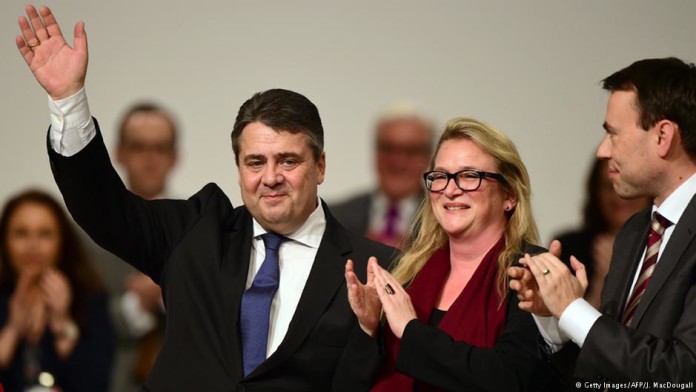A lower percentage of SPD delegates reelected Vice-Chancellor and Economics Minister Sigmar Gabriel as party leader Friday. The party put on a brave face as approval ratings continue to slump. Naomi Conrad reports.
As delegates trickled in for the second day of their party’s conference, they were greeted by a handful of protesters braving the icy cold drizzle: “The SPD is once again hip, it has to stop TTIP”, they chanted, as they held out damp leaflets condemning the free-trade agreement between the EU and USA currently under discussion.
Inside, meanwhile, Sigmar Gabriel, party leader, Vice-Chancellor and Economics Minister in one, did his best to convince the 600 delegates that the SPD – Chancellor Angela Merkel’s junior partners in the grand coalition government – is indeed about to emerge from the shadow of its coalition partners.
“Without the SPD”, he called as delegates cheered enthusiastically, “the government would be paralyzed by now”, refering to the rift between Merkel’s Christian Democrats (CDU) party and its Bavarian sister party the Christian Social Union (CSU), which has emerged increasingly highly critical of her “open-door” refugee policy.
In 2017, when German voters head to the polls again, the SPD would emerge as the winner, Gabriel vowed as delegates cheered: “We want to rule Germany again, and not just as part of a coalition.”
Uphill climb
His combative speech comes at a time when polls continue to paint a somewhat different picture: According to pollsters, Forschungsgruppe Wahlen, published on Friday, only 24 percent of voters support the SPD – the lowest level in the last nine months and barely more than in the 2009 elections when support for the party dropped to 23 percent, the SPD’s worst in post-war Germany.
In his speech Gabriel attacked Merkel and her party for pursuing a “hypocritical double strategy” in the refugee crisis. “You can’t expect to be celebrated in the morning for letting one million refugees come to Germany and then, later on in the day, pass laws aimed at treating them worse”, Gabriel said, reiterating the party’s call for a European-wide quota system.
Gabriel also attacked Merkel’s austerity policies. “I repeatedly warned Angela Merkel not to force austerity on France”, he called, veering from his written speech, “I told her it would only boost the National Front”, referring to the far-right group which emerged as the largest party in the first round of regional elections last Sunday.
The National Front’s success, he warned, came at a time when right-wing populists flourished in countries such as Poland, Finland, Sweden and Germany, where the AfD Party is expected to do well in several state elections next year.
It was up to European Social Democrats, Gabriel thundered, to fight against “these enemies of Europe.”
Playing to party left
On Syria, Gabriel promised delegates a vote before any future extension of the mandate of Germany’s military currently being deployed to support the anti-IS coalition with reconnaissance jets and a frigate – a mission which was passed by Parliament last week, with 28 SPD MPs voting against the mandate.
When it came to questions of war and peace, “only party members and no one else should have the right to decide the SPD’s position”, he said.

After a thundering applause, which went on for several minutes, delegates trickled out for lunch.
Inside, 25-year-old Nicolar Weckwerth from Schleswig-Holstein, sporting a bright-red scarf, told DW he fully supported Sigmar Gabriel. “His speech was very convincing”, he said.
Others though, particularly from the party’s left, disagreed: Tobias Afsali from the SPD’s youth wing took to the stage, accused him of lacking “clear red lines” and selling out to his coalition partners in several important policy areas: “We have to stop being the left wing of the CDU”, he called.
Later in the afternoon, after technical problems forced organizers to switch from tablets to paper and pens, 74 percent of the 614 delegates who cast their ballots voted to reelect Sigmar Gabriel as party leader. There were no challengers.
This is considerably lower than the 83.6 percent approval he gained at the conference two years ago.
Sigmar Gabriel did his best to shrug off the results: “Such is life in a democracy”, he said, adding that some within his party didn’t believe his policies “are left enough.”
But, he said, three quarters had voted for him, “and that’s why I accept this vote”, as delegates clapped and cheered.
OPINION:
Can SPD emerge from Angela Merkel’s shadow?
For years, the Social Democrats have been unable to beat Angela Merkel at the ballot box. With the chancellor now struggling due to her stance on refugees, will Germany’s second most-popular party finally step up?
Some 600 delegates are expected in Berlin for the Social Democrat Party’s (SPD) national party conference, which starts on Thursday. The meeting will provide the party an opportunity to plan how it will approach the next two years as the junior partner in Chancellor Angela Merkel’s “grand coalition” government.
The refugee crisis and Germany’s military involvement in Syria make the political landscape uncertain, and those issues will be central topics for discussion among SPD representatives. Family policy, the digital economy and workplace relations laws will be put under the microscope in Berlin as well.
For the first time in years, SPD members will be able to regard Opinion: Dangerous times for MerkelMerkel as a surmountable political opponent. This is mainly due to her “open door” stance on refugees, which has lost her much support. The SPD will be able to use its meeting to establish a new policy countering Merkel’s statement “We can do it.”
The search for a “responsible refugee policy”
SPD members will be able get first-hand experience of what recently arrived refugees are going through as a temporary shelter for 600 refugees has been built just meters from the conference center.
Ahead of the meeting, the team around the SPD General Secretary Yasmin Fahimi has stated it wanted to take a clear position on the issue. Rather than imposing a limit on the number of refugees coming into Germany, as called for by the Christian Social Union, the Bavarian sister party to Merkel’s Christian Democratic Union, the SPD is expected to opt for a slowing down of refugees coming into the country.
The refugees’ right to asylum is expected to remain untouched in their policy rethink, as their aim is reportedly to create a so-called “responsible refugee policy.”
Some policy changes could turn into sticking points for the grand coalition. For instance, the SPD’s proposed plan of increasing the protection given to victims of war in Syria. In an internal document obtained by the Düsseldorf-based “Rheinische Post” newspaper, the party argued that these people should be entirely taken out of the asylum-seeking process to relieve pressure on the local authorities who process their applications.
The SPD also wants young asylum seekers afforded special protection during any training or education phase, as well as them being allowed to stay on in Germany afterwards. This, as well as many other issues, should be set down in a new immigration law, party members have said. But the CDU and CSU have deemed a new immigration law unnecessary.
More diplomacy in Syria
Foreign policy is another issue sure to get attention at the three-day meeting with special interest given to the Germany military’s involvement in Syria as part of the fight against “Islamic State.”
The SPD is highly sensitive to military missions, Fahimi said on Tuesday in Berlin. The party now wants to work on a leading motion to show how peace could best be achieved in the country. The SPD general secretary said she believes that the Syria debate is important in order to “keep the party together.”
All eyes will be on Foreign Minister Frank-Walter Steinmeier during these discussions as he plays a major role in shaping the party – and Germany’s – foreign policy.
An unnecessary ballot
Voting will dominate most of the day’s proceedings on Friday. Everyone expects Sigmar Gabriel to retain his position as head of the SPD. Still, the exact result will be interesting. Two years ago he got a vote of 83.6 percent, a result which some considered fairly poor.
This time, the vote will play a role in predicting whether Gabriel will be the party’s next nominee for the position of chancellor. Lower Saxony State Premier Stephan Weil has thrown his support behind Gabriel, who also serves as vice chancellor and economy minister.
“Gabriel is the clear number one in our party,” he recently told German news agency dpa.
SPD voters themselves may have a different view on who would make the best chancellor candidate. According to a poll by the German newspaper “Welt am Sonntag,” many of the party faithful would prefer to see Steinmeier run for the chancellery.
But with the next German parliamentary election set for 2017, a formal nomination will not take place over the next three days in Berlin.
There had also been talk of the SPD putting two people at the head of the party, following the example of the opposition Greens and Left party. This issue, however, has been on the agenda after the party elects a leader, making it highly unlikely it will change the face of the party in the near term.
But it is clear to many that the SPD needs a revamp after being stuck in Merkel’s shadow for years. A recent Forsa survey showed voters’ support for the SPD at 24 percent while Merkel’s CDU came in at 38 percent.
SPD leaders will, however, take time to point out what they regard as the party’s successes, including the introduction of a minimum wage, retirement at 63 and rules to prevent abuse of part-time workers.
-DW.COM


















